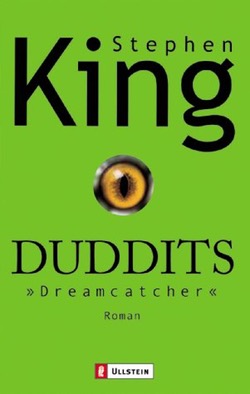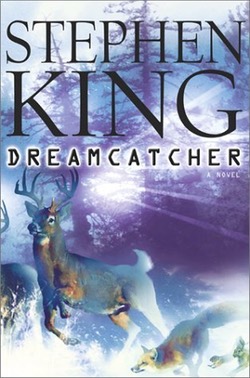On June 19, 1999, Stephen King went for a walk. Bad idea. Bryan Smith was driving his van in the opposite direction and when his dog started getting into the cooler he turned around, swerved onto the shoulder of the road, and ran over King. The damage? Right kneecap—split down the middle. Left leg—broken in so many places it looked like “marbles in a sock.” Spine—chipped in 8 places. Ribs—4 broken. Surgeries—complicated and painful. Painkillers—necessary. Suddenly, Stephen King was Paul Sheldon.
Before the accident King had decided to get serious about his non-fiction book On Writing. He’d also promised Scribner From a Buick 8. But five months after the accident, leg in a painful brace, an addiction to Oxycontin starting to bubble in his veins, he sat down to write, hoping it might distract him from his pain. It was too painful to sit at his computer, so he picked up a pen and “Suddenly I had this huge, huge book…I didn’t think about the pain as much. It’s like being hypnotised.”
The book was all about what had happened to his body. It might have saved his life. It was called Dreamcatcher. A lot of it was about poop.
The original title was going to be Cancer, and at the time, King thought it was hot stuff. In his intro to the screenplay for the eventual movie (starring Morgan Freeman, wearing fake eyebrows), he wrote, “I think Dreamcatcher is a brilliant exception to the rule, a classic suspense film that will eventually go on the same shelf with movies like Jaws and Alien.” In interviews he bragged that Dreamcatcher “would do for the toilet what Psycho did for the shower.” Then he got sober and in a 2014 interview with Rolling Stone he said:
“I don’t like Dreamcatcher very much. Dreamcatcher was written after the accident. I was using a lot of Oxycontin for pain. And I couldn’t work on a computer back then because it hurt too much to sit in that position. So I wrote the whole thing longhand. And I was pretty stoned when I wrote it, because of the Oxy, and that’s another book that shows the drugs at work.”
 Just as the books King wrote after getting sober in 2000 were cautious attempts to feel his way back towards being “Stephen King,” Dreamcatcher feels like an attempt to get his head together, a book patched together from other books and movies, taking incidents he’d already written about and viewing them through the prism of his pain. But there’s no reason to bash it, because while it doesn’t have the pure unhinged lunacy of his other “aliens in Maine” novel, it was also very different from the literary ambitions of his latest book, Hearts in Atlantis.
Just as the books King wrote after getting sober in 2000 were cautious attempts to feel his way back towards being “Stephen King,” Dreamcatcher feels like an attempt to get his head together, a book patched together from other books and movies, taking incidents he’d already written about and viewing them through the prism of his pain. But there’s no reason to bash it, because while it doesn’t have the pure unhinged lunacy of his other “aliens in Maine” novel, it was also very different from the literary ambitions of his latest book, Hearts in Atlantis.
That’s not necessarily a good thing, but so many horror authors, King included, find themselves moving away from scary monsters as they get older, wanting to polish their style and write about more subtle, human-sized horrors, yet here was King making a full-throated return to pulp, delivering an alien invasion sci-fi novel complete with poop, vomit, and exploding heads. It’s a bit like watching Barbara Kingsolver apply her formidable skills to dinosaur erotica, or learning that Tiger Woods has abandoned professional golf to become master of Myrtle Beach’s Shipwreck Island Putt Putt. It also teaches us a valuable lesson: when King is stoned, he really likes to write about alien invasions.
 The book begins as four middle-aged men—Beaver, Pete, Henry, and Jonesy—show up at the remote cabin in Jefferson Tract, ME where they shack up for a hunting party every year, each of them nursing a private wound. Beaver is a loser who’ll never be loved. Pete is a drunk. Henry is suicidal. And Jonesy was recently smashed to bits when he was hit by a car. Just when you think there will be warm and complex human drama, aliens invade. And not just any aliens. Shit weasels! These vicious little turds with teeth grow inside human colons, causing a lot of farting, and then they get pooped out in the toilet where they promptly launch themselves at the soft buttocks of their former human hosts and bite off their dicks. Or their faces. On the one hand, there’s a fascinating alien ecology at work here since the shit weasels exist in a symbiotic state with a red fungus called “byrus” and gray aliens called Grayboys, each playing host to the other and living in a sort of co-dependent eco-system. On the other hand, there are sentences like “And then Archie Perlmutter’s shit-weasel tore off the side of Freddy’s face as a hungry man might tear a drumstick off a chicken.”
The book begins as four middle-aged men—Beaver, Pete, Henry, and Jonesy—show up at the remote cabin in Jefferson Tract, ME where they shack up for a hunting party every year, each of them nursing a private wound. Beaver is a loser who’ll never be loved. Pete is a drunk. Henry is suicidal. And Jonesy was recently smashed to bits when he was hit by a car. Just when you think there will be warm and complex human drama, aliens invade. And not just any aliens. Shit weasels! These vicious little turds with teeth grow inside human colons, causing a lot of farting, and then they get pooped out in the toilet where they promptly launch themselves at the soft buttocks of their former human hosts and bite off their dicks. Or their faces. On the one hand, there’s a fascinating alien ecology at work here since the shit weasels exist in a symbiotic state with a red fungus called “byrus” and gray aliens called Grayboys, each playing host to the other and living in a sort of co-dependent eco-system. On the other hand, there are sentences like “And then Archie Perlmutter’s shit-weasel tore off the side of Freddy’s face as a hungry man might tear a drumstick off a chicken.”
Everyone in Dreamcatcher is in pain pretty much all the time. Pete has a knee that painfully locks, forcing him to crawl “and each time he bumped his leg the bolts of agony came.” Henry is constantly rehearsing his suicide. Jonesy is all-too-aware of the throbs and aches of the pins that are holding his hip together. By page 112, there have been two major car accidents, and two of the main characters are murdered shortly thereafter. Throughout the book there’s a constant awareness of the human body. A later important character, Duddits, lives in his hospital bed because he’s weakened by leukemia, and a climactic scene (someone’s throat getting painfully slashed with the jagged, broken edge of a plastic remote control) takes place in an imaginary hospital. You get the feeling that King doesn’t have the best associations with doctors.
 There’s also an unfortunate and rote reliance on other movies. A woman stands in the road screaming, “They’re back!” like Carol Anne in the sequel to Poltergeist. The first Grayboy is described as being like something from E.T., Fire in the Sky, and The X-Files. The first shit weasel is described as being like something from Parasite, Alien, or They Came From Within. But that’s consistent, because King also borrows from himself. Dreamcatcher turns into a political paranoia book (shades of Firestarter) with the entrance of Colonel Kurtz (name borrowed from Conrad’s Heart of Darkness), a deranged, right-wing, conservative, Christian military man who keeps talking about how the aliens are like a cancer and he and his soldiers are the chemotherapy that will keep their extraterrestrial virus from getting out of the quarantine zone and infecting regular Americans. He plans to do this mostly by murdering a bunch of people. A fan of genocide, a perpetrator of, seemingly, every single American war crime, Kurtz is almost too evil to be believed. At one point he forces his men to hover in their helicopters over a crashed UFO while he gives a long sermon over the radio. If you know your Stephen King, then you know that’s his equivalent of a villain in an old silent movie twirling his mustache. Like Norman Daniels in Rose Madder, Kurtz is a Dagwood sandwich of everything King hates, more a pile of ingredients than an actual human being.
There’s also an unfortunate and rote reliance on other movies. A woman stands in the road screaming, “They’re back!” like Carol Anne in the sequel to Poltergeist. The first Grayboy is described as being like something from E.T., Fire in the Sky, and The X-Files. The first shit weasel is described as being like something from Parasite, Alien, or They Came From Within. But that’s consistent, because King also borrows from himself. Dreamcatcher turns into a political paranoia book (shades of Firestarter) with the entrance of Colonel Kurtz (name borrowed from Conrad’s Heart of Darkness), a deranged, right-wing, conservative, Christian military man who keeps talking about how the aliens are like a cancer and he and his soldiers are the chemotherapy that will keep their extraterrestrial virus from getting out of the quarantine zone and infecting regular Americans. He plans to do this mostly by murdering a bunch of people. A fan of genocide, a perpetrator of, seemingly, every single American war crime, Kurtz is almost too evil to be believed. At one point he forces his men to hover in their helicopters over a crashed UFO while he gives a long sermon over the radio. If you know your Stephen King, then you know that’s his equivalent of a villain in an old silent movie twirling his mustache. Like Norman Daniels in Rose Madder, Kurtz is a Dagwood sandwich of everything King hates, more a pile of ingredients than an actual human being.
King also makes Dreamcatcher the anti-It. Whereas It was about five mildly psychic kids who perform a heroic act as children, then grow up, forget about it, and enjoy great success, Dreamcatcher is about five mildly psychic kids who perform a heroic act as children (they save the young Duddits, who has Down Syndrome, from being forced to eat shit), then they grow up and become enormous failures. At the climax of the book, the surviving kids have to wrassle up Duddits, probably the least-convincing of King’s mentally handicapped characters, and deploy his psychic abilities to stop the last Grayboy from contaminating the Maine water supply. None of this is bad, in and of itself, but King just doesn’t feel up to it. Whereas It felt epic in scope and ambition, Dreamcatcher feels small and limited, the setpieces feel exhausted, the solutions to problems seem pat. The borrowings from other books and movies give a sense that we’ve been here before. Many times. King also seems to be doubling down on the grossness factor, and while part of that may be because he was forced into an extreme awareness of his bodily functions while he was writing this book, scenes like a man almost picking his nose to death feel like he’s trying too hard to be “Stephen King, Grand Master of the Gross Out.”
 The book came out in March 2001, and debuted at #1 on the New York Times bestseller list, dropping out of the top slot three weeks later. It ultimately stayed on the list for a total of 15 weeks, about average for a King book back then. When it came out in paperback it fell off the bestseller list fast, overshadowed in critics’s minds by On Writing which was released in June of that year. While On Writing didn’t burn up the charts, and actually had a smaller debut than most of King’s books, reviewers were surprised at how good it was, and it has gone on to become something of a classic.
The book came out in March 2001, and debuted at #1 on the New York Times bestseller list, dropping out of the top slot three weeks later. It ultimately stayed on the list for a total of 15 weeks, about average for a King book back then. When it came out in paperback it fell off the bestseller list fast, overshadowed in critics’s minds by On Writing which was released in June of that year. While On Writing didn’t burn up the charts, and actually had a smaller debut than most of King’s books, reviewers were surprised at how good it was, and it has gone on to become something of a classic.
Dreamcatcher on the other hand, has become particularly reviled, and the lackluster movie adaptation in 2003 didn’t help (it made $33 million on a reported budget of $68 million, also, Morgan Freeman wore fake eyebrows). But, as King wrote in the introduction to the screenplay, “Speaking for myself, I’d rather have bad than boring.” And while Dreamcatcher is actually kind of boring, there are moments of shit weasel madness that rise to the level of bad. Memorably so.
Grady Hendrix has written for publications ranging from Playboy to World Literature Today and his latest novel is Horrorstör, about a haunted Ikea.











On the other hand, the movie did star Timothy Olyphant, so it couldn’t have been all bad.
I enjoyed Dreamcatcher, regardless of the tropes. The book had better tension, angst and pacing than the film, IMHO.
One major thing has been left out of this, and it’s kind of the only thing that pulls this story together with the metaphor about King’s recovery and renewed addiction.
The Grayboy wasn’t real. They HAD BEEN real, but by the time Jonesy left the area, the Grayboy was dead. It was Jonesy driving the bus, so to speak, though he compartmentalized that, he was no longer possessed. It was King’s letter of hope to himself, that though he was trapped in his own mind by the addiction to Oxycontin, he could overcome it and fight it and maybe defeat it, as Jonesy tried to do.
The novel isn’t awful, but at times it almost seems like a pastiche (or parody?) of a Stephen King novel rather than a serious work. Also, I seem to remember (it’s been a long time since I read it) that there is a ridiculous twist at the end where Jonesy was never actually possessed by Mr. Gray? It was just a split personality thing? I do remember how lackluster the back half of the novel feels, but that is a problem for many authors that set up an interesting mystery (setup is always easier than resolution).
The movie was awful, I don’t think I managed to watch it all.
Aeryl – that’s a good point, although I read it as less a message of hope King was sending to himself (although that’s a cool take on it) and more part of the 16-car-pile-up of confusion that exists in the back third of this book. The way I read it (and I could absolutely have read it wrong), there are a couple of possibilities: 1) Mr. Gray is a mental construct that Jonesy creates, 2) There were no Grayboys and really it was byrus all along that caused people to “see” Grayboys, and so Jonesy is possessed with byrus, 3) There is a Mr. Gray but he’s a purely telepathic being by the end of the book, the same way Jonesy is by the end, and they’re fighting over that one body.
I read it as 3, but I think King probably intended 1 or 2. I was just never clear which, so I went with my favorite!
I was flipping channels one night when I caught the end of the movie version.
My reaction:
“Huh?”
I looked it up online to see what the movie was and looked it up on wikipedia, getting the book summary first instead of the movie.
My reaction:
“HUH!?”
Have not yet been tempted to read the book. I’m pretty sure I would be only more confused if I did.
I still keep thinking about the part where that guy forced ‘himself’ to eat a bunch of raw bacon. Gross.
@GradyHendrix
To be honest, while I always read it as Jonesy creating the Grayboy mental construct, the further interpretation never occurred to me until reading your connection between his recovery and the writing of this novel. I never really differentiated the differences in his writing, nor how outside influences effected it much until reading your reviews.
My problem with this book, and this type of book from King, is that I can’t stand body horror. It just grosses me out, and I realize that’s the point, but… well, if a book makes me nauseous, it’s harder for me to enjoy.
@GradyHendrix – Just finished your book Horrorstor. Wonderfully disturbing, in all the right ways!
Reading this review made me happy. The fact that he almost named the book ‘cancer’ made me laugh because I went through six months of chemo. Everything in this review that speaks to King’s experiences after the accident (the body horror, the bowel movements, the drug addiction/lucidity issues) rings so clear to me from my time in the chair. If I were a writer this is sounds like a book that I would have written during treatment. I don’t think I’ll be sitting down to read this any time soon but I can certainly relate to the experiences and mindframe King was in. After you’ve been injured or gone through cancer poop becomes really even more important and funny that it ever was before. And I guess when you’re Stephen King this is how you process that. Heh.
This was the second Stephen King I read as a teen (the first being “Friedhof der Kuscheltiere”, don’t know the English title, something like “Pet Cemetary” perhaps?) so I escaped the feeling you describe as “knowing many tropes already” or the feeling of borrowed stuff, simply not knowing this particular stuff being a 14 year old just starting to read horror at all.
Having a fresh mind, I actually quite liked it – and I remember the entry from my reading diary saying “DON’T READ THAT ON THE TOILET” so… at least Stephen Kings intention worked well for me there :D
I have that book at home, so maybe I should give it a reread one day.
Not a great book, but the first Stephen King book I read after “The Stand” (which I read 10 years earlier). It made me curious about his other work and I finally picked up his Dark Tower series. I’ve probably read a dozen of his books now. This book served as a kind of gateway into King for me. Having said that, I haven’t read it since.
I really liked this book when I read it. I don’t look to King for much more than entertainment and, for me, it provided in spades. I thought it was a good page-turner, it had allusions to Sherlock Holmes (the boxes), a few scrapes, the occasional pickle, and some really good descriptions. I got lost in this book.
It gets a lot of flak but I don’t dislike body-horror/gore and I thought the entrance of the aliens was really good. It was unsettling and upsetting but ultimately convincing.
Should I read his other druggy books. The Tommyknockers and Cujo spring to mind? Any others?
I’m actually rereading Dreamcatcher… I read it about 11 years ago. Having read most of King’s books, and only reread the first few Dark Tower books up until now, I’m surprised at how much I actually enjoy it… at least, the beginning chapters.
The character development in Dreamcatcher is quite great, really. From the get-to, you care about the 4 friends (Jonesy, Henry, Pete and Beaver) and–SPOILERS–one of those characters’ early death come as a great shock. I also find the body-horror aspect of the book very well written. It is an imperfect book, however. The Kurtz character is too over-the-top
This review is correct that Dreamcatcher is revisiting many of his old tropes, but being a King fan, I don’t believe that’s such a bad thing. I think the book gets a bad rap because the film is so wonky. They tried to adapt it too doggedly… except in certain aspects, where they just went off the deep end (alien Duddits??!!).
The best part about the film is the actors who play the 4 friends do a very good job. Anyway, I know it gets a bad rap, but I’ve read WAY worse King books (Insomnia, Bag of Bones, the last 3 Dark Tower books, The Regulators, to name a few)… books that are not even very well-written. I’ve also read way better books (Pet Sematery, The Shining, It, The Long Walk, Hearts in Atlantis, The Dark Half, and holy cow it’s a long list of good ones)
They should have simplified some of the aspects of the book for the film, just to capture the spirit. I think, also, they made the aliens all 1 creature in the film, which is the wrong kind of simplification and a bad decision, but oh well. The body horror and the character development around the 4 friends make this a decent read, even though it’s far from his best work.
I think the first half of “Dreamcatcher” is a blast – it’s just a balls-to-the-wall, unabashedly goofy homage to old-school alien invasion stories. Unfortunately, the second half is far too generic and extremely bloated. I’d compare the novel to “The Regulators” in that regard.
I read this 10 or so Yeats ago and adored the characters so much (excepting the aliens and the (DeadMeat) hunters so much that I was just googling the book to help me remember Duddits real name. My cat, at age 9 or so has never had a 1st name so…. Probably not fair to Duddits OR him (Mr. Silverman.) He is all gray so I began to name him Mr. Gray. UNTIL I remembered why that name was so familiar! He’s a bit psychic and I recall Beaver, I think was the one who could see and follow “the line” that Duddits saw.
Whatever! I recommend it for entertainment and good character development. As proven by an old chick who names & doesn’t name her cat after one of them. I’m off to Google Duddits’ proper name – Cheers!